The Wisdom Buddha Protector of Je Tsongkhapa's Tradition
Spiritual Lineage
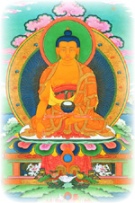
Buddha
Shakyamuni
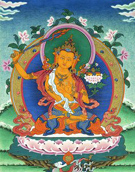
Buddha
Manjushri

Je Tsongkhapa
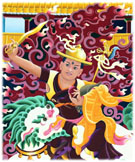 Wisdom Buddha
Wisdom Buddha
Dorje Shugden
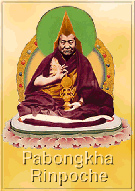
Pabongkha Rinpoche
(1878-1941)
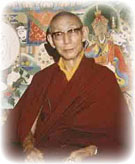
Trijang Rinpoche
(1901-1981)
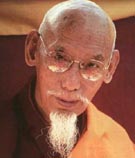
Song Rinpoche
(1904-1984)
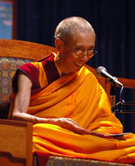
Geshe Kelsang Gyatso
(born 1931)
An Interview with Jamphel Yeshe
Biographical statement by Jamphel Yeshe, sixty-year-old President of the Dorje Shugden Society, on the Wanted Posters and the persecution and death threats suffered by him and his family. 1997
Jamphel Yeshe, the sixty-year-old President of the Dorje Shugden Society, summarized and wrote down his life's contributions upon request from a Dorje Shugden support group. What follows is an extract from the translation of an unpublished biographical statement.
From September 1997, the Tibetan community has been circulating my dossier (one among ten others) published by the Security Bureau of the Tibetan exile government. Like a "wanted poster," it was put up repeatedly on walls of Tibetan settlements around India and Nepal. This poster gives basic information about my whereabouts and that of my family. It also gives defamatory, wrong information about my person, falsely accusing me of working for the Chinese government, the worst possible disgrace for a Tibetan in exile. This and other defamatory acts that aim at ostracizing me and my family from society have been very painful and changed my life radically. Even worse than the death threats against me were the threats against my wife, who had to leave as a result. I had to send the children abroad for safety reasons. When my six-year-old daughter playfully answered the telephone, anonymous callers told her, "We will kill your Daddy." This traumatized her so severely that she would check on me constantly, try to close all the doors, and prevent me from going outside. We have all been separated from each other for quite some time now, mother and father from children, husband and wife from each other. In addition, my business is boycotted by Tibetans who believe the distortions of the exile government, and my economic base is disappearing. I am alone and isolated from others in my already isolated exile society.
I am listing here my small contribution to social and public life since coming into exile, in order to set the record straight. Soon after I escaped from Tibet in the middle of 1959, I served as a group leader in Dalhousie for several years. Under my care were about eighty old people who were part of a temporary settlement of five hundred Tibetans. At the same time I was in charge of the Dalhousie branch of Ganden Shartse monastery. I acted as its treasurer for several years. After that, I served the Dalhousie branch of the Cholsum Organization, the largest umbrella of all Tibetan regional and social welfare organizations.
While studying in Varanasi at the Central Institute of Higher Tibetan Studies, I contributed to many activities of the Institute. I was also an active member of the freedom movement from its inception at Varanasi. This organization became part of the backbone of the Tibetan exile administration. I served this organization in various capacities also in Dharamsala and Delhi. From 1975, I served the Gelugpa Cultural Society as a representative of Ganden Shartse and was active in exploring the possibility for a joint Mönlam Festival The Great Prayer Festival was instituted by Je Tsong Khapa in the fourteenth century to commemorate the great miraculous deeds of the historical Buddha Shakyamuni. It was traditionally a Gelugpa-dominated occasion and took place in Lhasa the first month of the Tibetan year. of all Buddhist traditions. In 1979 the Great Prayer Festival was celebrated by monasteries belonging to the Gelug, Sakya, Nyingma, and Kagyu traditions of Tibetan Buddhism, presided over by the two Tutors of His Holiness, Kyabje Ling Rinpoche and Kyabje Trijang Rinpoche as well as many abbots, tulkus, monks, scholars and prominent lay people. This was the most special event in the history of the Gelugpa Cultural Society. While in Tibet the Great Prayer Festival, originated by Je Tsong Khapa in the fifteenth century, traditionally included everyone, today there are several such festivals organized under the same name and in the same style by different religious groups in the exile community and at different times of the year. With the split in the Gelug tradition forced by the exile government, there are now also separate Gelugpa Mönlam Festivals. In addition, Tibet House in New York, for example, calls its yearly fund raising event, held around the traditional Tibetan new year, also Mönlam Chenmo Festival, while in the year 2000 The Great Prayer Festival will be celebrated in Washington D.C. at the time of the Dalai Lama's birthday with a million visitors expected to participate in the festivities.
During my long stay in Delhi, I have tried to perform social services for different kinds of Tibetans according to my capacity. My personal name, Jamphel Yeshe or Chatreng Yeshe, is well known for my contribution in the Tibetan community. I have made continued efforts to request members of my own community and other countries to support Tibetans in need and the Tibetan cause in general. I received a medal of appreciation from Amdo Jamyang, the camp leader at the time of Majnuka Tilla in Delhi, for helping raise fund for the Tibetan school at that camp. My own regional group, the Chatreng Association, has acknowledged my contribution to developing its organization and helping its members. I also tried to find a way to build a residence for His Holiness the Dalai Lama in Delhi, since he does not have a place of his own to stay on his many visits to and through the Indian capital on his way abroad. But since I am merely an individual without means, I made an impassioned appeal and detailed proposal to the Tibetan Women's Association. But the plan never materialized. His Holiness still has to stay in hotels when he comes to Delhi.
For all my life in exile, I have had the welfare of Tibetans and the idea of freedom constantly on my mind. As is well known in the Tibetan community, I worked towards that end in many different ways. All of this is destroyed now by the defamation campaign against me and my family. Because of death threats, I cannot go anywhere alone. I have to live in constant fear of losing my life, my family, my community, my access to religion, my livelihood, -- in short, everything that is dear to me and makes my life worth living.
From an interview with Jamphel Yeshe, Delhi, October 1997: When we first escaped to India, it was because of our religious faith. We also had the strong hope to return to a free Tibet. For more than thirty years we held the hope we will get freedom for our country. But that has changed completely now and not only because the Chinese are so intransigent. Even the hope for future freedom has been dashed because of the exile administration's more recent policy. With the five-point peace plan delivered in Washington, D.C., in 1987 and incorporated into the Strasbourg Proposal delivered to the European Parliament in Strasbourg 1988 the Dalai Lama outlined a strategy for a Tibet under Chinese suzerainty. Today this plan is formulated as "the Middle Way approach" to the political status of Tibet asking for cultural autonomy rather than political. The conclusion, the goal of Tibetan independence has been sacrificed in the process but this was not entirely clear to Tibetans until the 1990's. Tibetans believed in the 1980's that the Dalai Lama's long term strategy was independence and the Strasbourg proposal was just a temporary solution.
Q: How has the ban affected you personally?
A: Since the ban we have endless inner turmoil, day and night. My situation is not exceptional. Each and every Tibetan Buddhist who is not able to relinquish faith in his or her I am using "his or her" because the Tibetan was not gender specific as it would seem if I used only "his." Guru is in the same situation. Since the ban was imposed by the Tibetan exile government, families have broken down in every Tibetan community. Children broke relations with their parents and teachers and students have stopped speaking with each other. These things happened because the Tibetan exile government started a signature campaign against our faith. We were asked to sign a list swearing that we will give up our reliance on the Dharmapala (Dorje Shugden) for this and all future lives. These lists were passed around very publically so everyone could see who signed and who not. When the government stopped the Women's Association and Youth Congress continued to push people to sign. Through the public nature of this campaign we have been completely marginalized. As the president of the Dorje Shugden Society, it was my duty to inform all Tibetans about the situation.
If a Tibetan speaks out, the automatic reaction now is to find out whether or not he relies on Dorje Shugden. If he does, then as a Tibetan I should not have any contact with him, according to the Tibetan exile government. Because of the atmosphere of distrust created this way, I have lost many of my former friends and business contacts. They all know I rely on Dorje Shugden. It has become a trend within the Tibetan exile community for people to declare openly that they want to go after me and finish me. Threats are also made openly against my colleagues in the Society and we experience this prevailing atmosphere of fear and distrust as a great burden.
I am a family man, I have three children. My oldest son is twelve years old, the second son nine years, and my daughter is six years old. The two older children were in school at the Tibetan Children's Village (TCV) in Dharamsala. I and my family received many explicit death threats. I found out through reliable sources -- I can't tell you who -- that an ex-military man and a member of the Tibetan parliament from Rajpur was discussing my two sons and their whereabouts in school in Dharamsala and my involvement with the Dorje Shugden Society with other Tibetans from a military background. Many Tibetans have joined the Indian army as part of the Indo-Tibetan Border Police after the CIA supported Khampa resistance ceased to be active. They have their own units, their own uniforms with their symbols but do not wear them publically. Suitable in high altitudes, they had hopes of helping free Tibet. They were used in the Bangladeshi war, in the front lines, according to Tibetans. They are trained in the Dehradun-Rajpur area, the foothills of the Himalayas of U.P. in India. See, for example, A. Tom Grunfeld: The Making of Modern Tibet, p. 162. He said they were well trained and that he and his colleagues would do whatever was necessary and whatever the Tibetan exile government wanted them to do against the Dorje Shugden people. For Tibetans who firmly believe that the Dalai Lama's life is threatened by those who rely on Dorje Shugden, these sentiments, and the willingness to act on them, are completely credible. So I took my children out of the school in Dharamsala and sent them to a safe place in another country. The perception was that anyone who wanted to attack us was free to do so. The threat letters I received included statements like, "We will not spare your wife and children." One such letter says (in translation): "To Tashi Dolma [Jamphel Yeshe's wife], from D.P. Gyatso. According to what I heard, your president husband, Chatreng Yeshe, has engaged in many plans regarding the Dalai Lama. Moreover, it is also said that you are going on a film shooting about the Dalai Lama, [Seven Years in Tibet] This being the case you are not permitted to participate in this filming. If you go, I will not spare you easily. We are youths of Darjeeling Voluntary Youth. If you don't believe it, you can come to Darjeeling anytime. Do you understand, slut. Secretary of Youth Group, Darjeeling, Kalimpong. P.S. Some of us are now in Delhi. You have to inform Chatreng Yeshi."
My wife and I received many threatening phone calls, and even our six year old daughter. When asked for a name, the answer was only "I am a man." Once, when they called, the child answered the telephone, as she often did, and the person on the other end told her, "There are fifteen of us here in Delhi and we will kill you and we will kill your father. We will destroy you." My daughter was very upset. She went to close all the doors and told me to stay inside. Early in the morning she would come to my bed and touch me. When I moved, she shouted, overjoyed, "Daddy is still alive."
Political Leader
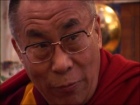 Dalai Lama
Dalai Lama
The Hypocrisy
Follow the story of the Dalai Lama's 30-year political campaign to destroy a centuries-old spiritual tradition taught to him by his own Spiritual Guide, and the efforts of those he's hurting to stop him:
Brief summary
- What is happening
- What is the Western Shugden Society (WSS)?
- Detailed reports of discrimination from inside India and elsewhere
The Dalai Lama's position
- A Great Deception
- Praise to Wisdom Buddha Dorje Shugden by the Dalai Lama
- In the Dalai Lama's words
Why is this happening?
- Why is this religious suppression taking place?
- Are the Dalai Lama's reasons valid?
Efforts to restore religious freedom
- Geshe Kelsang's open letter
- The ban is illegal and unconstitutional
- Press reports and videos
- Dorje Shugden Devotee's Charitable and Religious Society
- Dalai Lama sued for repressing religious freedom
- A conflict with a solution
- Announcement from Serpom Norling Monastery
Analysis of situation
- Sectarianism
- Can the Dalai Lama ever make a mistake?
- Is the Dalai Lama the only spiritual leader in Tibetan Buddhism?
- Theocracy or democracy?
- Spirit worship or authentic Buddhist practice?
- Freedom of worship
- The Dalai Lama's justifications
- Analysis by Dalai Lama's translator (PDF)
- What would Thomas Jefferson think of the 14th Dalai Lama?
- Book Reviews
- Videos
Evidence and first-hand accounts
- Chronological background
- Discord in exile documentary
- Political motivations for the ban
- Summary to date from Tibetan exiles
- Other
Ongoing persecution 2008-2010
- Recent vote sticks and call for help
- Forced signature and ID card campaign
- Persecution of monks at Sera Monasteries
- Public humiliation and explusion of monks
- Letter to Indian Prime Minister regarding abuses
- Letters from Dorje Shugden Devotees
- Urgent appeal from Sera Monasteries
- Support from Indian police
- Western Shugden Society letter to Sera monasteries
- Western Shugden Society letter to TGIE
- Heartfelt request from monks in Mundgod
- More discrimination planned around the world
- Letter from an FPMT monk
- Other
- What you can do